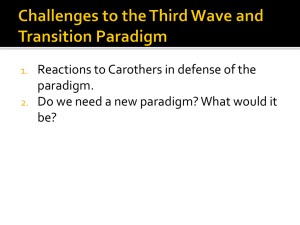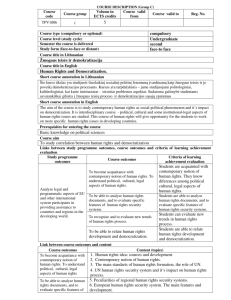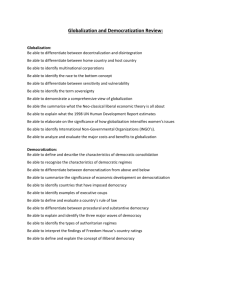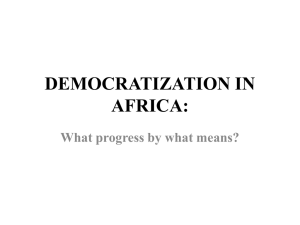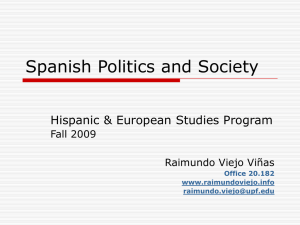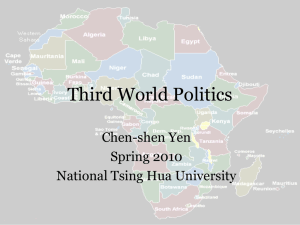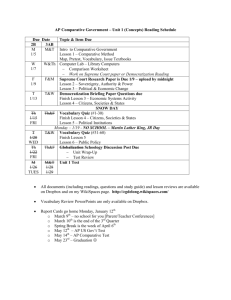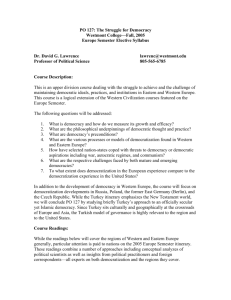DEMOCRATIZATION Democratization has established itself as
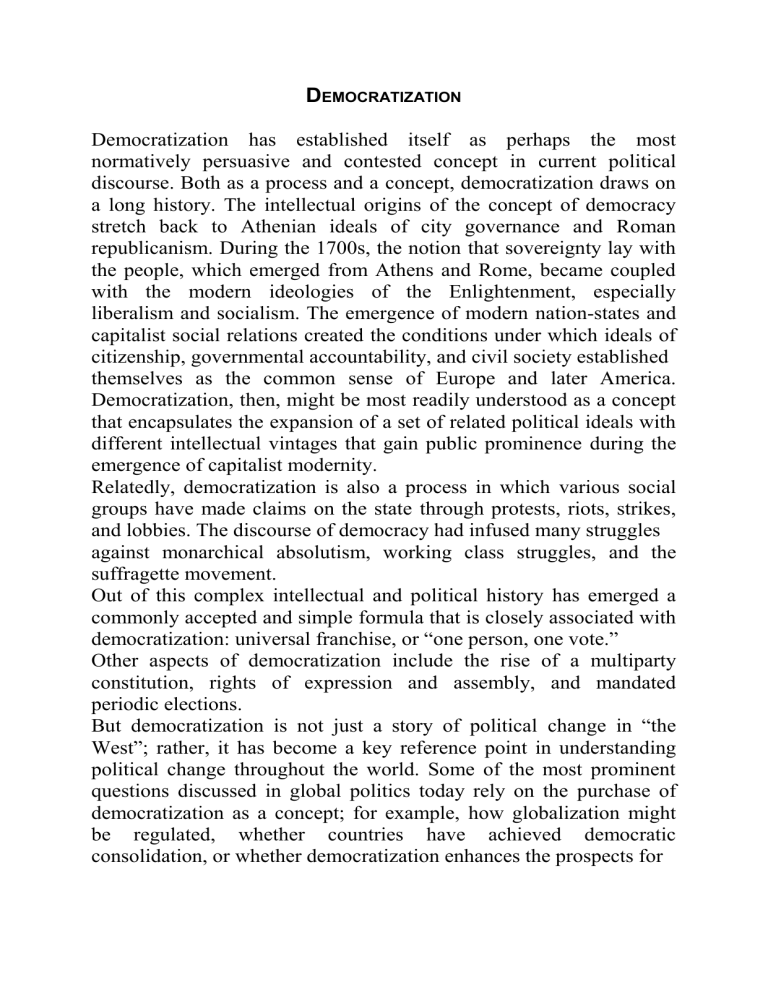
D
EMOCRATIZATION
Democratization has established itself as perhaps the most normatively persuasive and contested concept in current political discourse. Both as a process and a concept, democratization draws on a long history. The intellectual origins of the concept of democracy stretch back to Athenian ideals of city governance and Roman republicanism. During the 1700s, the notion that sovereignty lay with the people, which emerged from Athens and Rome, became coupled with the modern ideologies of the Enlightenment, especially liberalism and socialism. The emergence of modern nation-states and capitalist social relations created the conditions under which ideals of citizenship, governmental accountability, and civil society established themselves as the common sense of Europe and later America.
Democratization, then, might be most readily understood as a concept that encapsulates the expansion of a set of related political ideals with different intellectual vintages that gain public prominence during the emergence of capitalist modernity.
Relatedly, democratization is also a process in which various social groups have made claims on the state through protests, riots, strikes, and lobbies. The discourse of democracy had infused many struggles against monarchical absolutism, working class struggles, and the suffragette movement.
Out of this complex intellectual and political history has emerged a commonly accepted and simple formula that is closely associated with democratization: universal franchise, or “one person, one vote.”
Other aspects of democratization include the rise of a multiparty constitution, rights of expression and assembly, and mandated periodic elections.
But democratization is not just a story of political change in “the
West”; rather, it has become a key reference point in understanding political change throughout the world. Some of the most prominent questions discussed in global politics today rely on the purchase of democratization as a concept; for example, how globalization might be regulated, whether countries have achieved democratic consolidation, or whether democratization enhances the prospects for
peace. In essence, democratization contains at its core two distinct but closely related aspects: a process by which political life changes, and a normative view of political life making statements about how political communities should behave.
Defining is always closely related to understanding.
Although democratization has currently accrued a widely held and relatively straightforward definition, this has not closed off theoretical or analytical controversy.
There is no space to deal with this fully, but we can review some key points of departure here to reveal the different emphases and nuances that can be given to the meaning of democratization.
Democratization as the End of History
Francis Fukuyama, following his interpretation of G. W. F. Hegel, argues that liberal democracy constitutes the historic victory of a metaphysical Idea over its contenders in the modern age. The Idea of individual rights, a product of liberal theories of the eighteenth century, has won out over its historic rivals, notably fascism and communism. Although Fukuyama has revised his judgments, democratization here is seen as the historic ascendance of an uncontested concept for thinking about the political good.
Democratization and Capitalism
Vladimir Lenin famously coined democracy as the best “political shell” for capitalism. Marxists have often tried to understand democratization as a political accompaniment to the establishment of a capitalist economy; democracy might even fulfill certain functions for capital, for example creating legitimacy for a certain social order, or removing certain aspects of social life from the political sphere and renaming them as private. Perhaps the best-known Marxist understanding of democratization has derived from Antonio Gramsci.
Liberals have also associated democratization with capitalism, stressing the centrality of the emergence of the middle classes.
Democratization and State Building
Historical sociologists have identified the ways in which democratization has unfolded as part of the emergence of modern nation-states. Most important here are the following processes. As states introduced routine centralized personal taxes, people have demanded some influence over the way the public purse was used: no taxation without representation.
As nation-states consolidated, people began to identify their interests with the sovereignty of the state as well as their local polities:
National newspapers and wars between nation-states produced new formulations of the national interest in which the actions of one’s state became of relevance to all.
Democratization and Liberalism
Liberals have understood democratization as the achievement of a society that treats each person as endowed with basic political rights.
Through a process of political discourse and persuasion, liberal societies move toward democracy as a way of respecting and realizing the rights of all to participate in a polity, subject to some basic conditions. In this theorization, democratization is expressed as the realization of an immanent human nature, whether acting in a republican or rational utilitarian spirit.
Intellectual interest in democratization has continued to grow throughout the last century, and shows no sign of stopping. It is striking that a great deal of the intellectual discussion of democratization and the political ferment that created historic democracies has been located in a small geopolitical space, namely
Europe and North America. And yet, in the present day, many states have recently democratized or have democratization as their principal compass for the future. Democratization is associated with security, legitimacy, political order, and good relations between states.
Democratization has grown from a political ideal engaged in the experiences of Western modernity to a kind of universal good.
Consequently, a significant body of literature on democratic transitions, or “transitology,” has emerged. Perhaps the best-known starting point here is Samuel Huntington’s waves of democratization approach.
Samuel Huntington identifies three waves of democratic transition
(1828–1926, 1943–1962, 1974–present) during which certain states
(and their elites) gained the wherewithal of dealing with popular pressures on the state by democratizing. The true test of this transition is the “two turnover” test, which means that an incumbent party is voted out of office, then its successor is also voted out of office without a collapse in the democratic constitutional order. Whether or not Huntington’s model stands up to scrutiny, the idea of an ever-
expanding wave of democratization remains at the heart of much political analysis.
Multiparty politics has indeed coursed through formerly nondemocratic regions of the world: the retreat of military regimes during the 1980s in Latin America, the cautious democratization of
East Asia, the holding of multiparty elections through Sub-Saharan
Africa during the 1990s, and the adoption of multipartyism in the former Soviet Union and aligned states in eastern Europe. Few states have succeeded in avoiding the democratic waves altogether, and these states are increasingly represented as aberrations or even pariahs.
Democratization has never been a straightforward affair, and its current unprecedented global reach has only added to the questions that people have brought to bear on the world’s most prominent language of political change and the prospects for democratization.
Here, we can only note a selection of issues.
It is easy to define a certain kind of imperialism in the globalization of democratization. Western states condition aid on democratization, strongly condemn and ostracize (some) nondemocratic regimes, and sometimes ostensibly intervene coercively with a view to establishing multiparty constitutions in certain states. This produces two paradoxes: First is that democratization has become a project of powerful international actors that impose democratization on other parts of the world. Second, democratization is posed less as a choice for societies and increasingly as the presiding orthodoxy, outside of which little exists.
However, there might be a range of alternative claims to democratization, embedded in other historic and cultural milieus:
Islamic democracy, socialist democracy, or some forms of communitarianism.
Relatedly, perhaps the globalization of democratic discourse is ushering in a more ambitious period for democratization.
Globalization has created the need not merely for the expansion of democratization to all states, but also a democratization above the nationstate: the creation of global civic constituencies, the democratization of multilateral organizations, perhaps even a global constitution. Some of these ideas are fleshed out in the concept cosmopolitanism.
Democratization’s expansion has been accompanied by an increasing formalism. What historical sociologists had understood as a profound change in the nature of a society has been rendered more a matter of formal constitution building. All sorts of more substantive politics might work beneath the periodic organization of elections, ranging from unreconstructed authoritarianism to new forms of populism.
Furthermore, democratization—even if implemented more substantially—does not solve all the ills of all societies. Political economists have highlighted how democratization can avoid dealing with drastic economic inequalities and a wide range of forms of discrimination and oppression within the market and the workplace.
This is part of the story of South Africa’s transition from 1994. More radical commentators have seen the globalization of democracy as the circulation of elites, or low-intensity democracy that principally legitimates a free-market international order.
Finally, democratization is not solely an issue for countries outside the
West. Despite their selfrepresentations as bastions of democracy, all
Western states have violated tenets of the liberal democracy ideal.
This is all the more obvious and contentious since 9/11.
All these points combine strongly to suggest that democratization is best understood as a process, not an endpoint. Unless the democratization process itself is in some sense owned by the people, its prospects of moving toward what transitologists dub consolidation would appear to be drastically reduced.
—Graham Harrison
Further Readings and References
Harrison, G. (2002). Issues in the contemporary politics of Sub-Saharan Africa: The dynamics of struggle and resistance. New York: Palgrave Macmillan.
Huntington, S. P. (1993). The third wave: Democratization in the late twentieth century. Norman: University of
Oklahoma Press.
Pridham, G. (1994). Democratization in Eastern Europe: Domestic and international perspectives. London:
Routledge.
